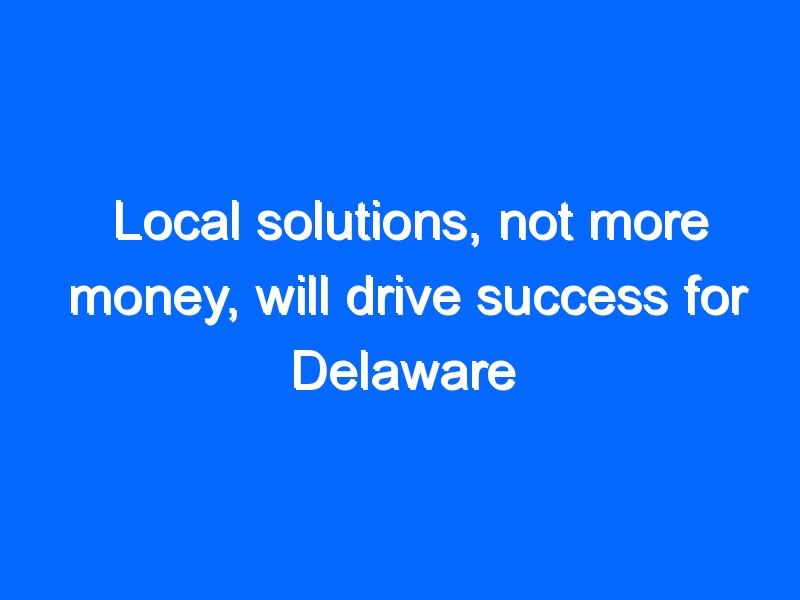 Delaware State News
Delaware State News
This election year some local candidates have claimed that the state of Delaware needs more money through higher and new taxes. They believe that through additional revenue from taxpayers they can create new programs and departments to deal with our challenges of growing our economy, rebuilding our infrastructure and enhancing education.
As a father, a longtime community volunteer, a business owner and the former Mayor of Milford I have learned that more money does not mean more solutions. This is especially true when money is thrown at a problem before the issue is evaluated, discussed and fixed from within.
My mindset, and the mindset of many other Delawareans, is that our large issues involving the economy, infrastructure and education can be solved through building partnerships between communities, businesses and government that involves everyone.
The state of Delaware is already one of the highest spending states per capita, and as you may have seen, our results are less than impressive. The culture in Dover and by some candidates for office to throw more taxpayer money at our challenges has been a losing strategy for years.
Our financial problems in the state of Delaware do not come from a revenue problem but a lack of leadership to create long-term fiscal policies to steady resources in a moving economy.
In 2017 lawmakers cut 20 percent of critical services like local volunteer fire companies and senior centers while increasing taxes. This was done as a “sky is falling” scenario played out in Dover over a loss of $400 million in state revenue. This year the state generated an additional $800 million just months after the “state of the economy” was used as a political move to cut our local programs and raise taxes on all Delawareans. This could have been prevented with long-term, smart fiscal policies.
The biggest effort in 2018 was the development of Ken Simpler’s budget smoothing reforms. It’s simple: tie the growth in government to personal income, inflation and the economy. When times are good, we save the extra money and when times are bad, we spend the savings so that important services continue to be provided.
It’s amazing how controversial that idea became until you realize that there are those in the General Assembly who want to spend as much as they can, and create as many new government programs as possible.
Despite the endorsement of Gov. Carney, Treasurer Simpler, and more than half of the legislature, the Big Spenders were able to block the measure. I am convinced that future generations of Delawareans will thank us for these innovative reforms.
One of the most critical investments we can make in the lives of our local families is creating an environment for economic growth. With quality employment, our families can be self-reliant and control their own future.
In Milford, the investments made by Bayhealth Sussex Campus, Nemours Pediatric & Senior Care and Nationwide Health Services are all part of a collective effort to grow the local economy. A concern repeated across all sectors and sizes of business is the availability of a growing, strong workforce with the opportunity for continued education. In addition to increasing the quality of our great local public schools, we need to focus on vocation education and training, providing opportunities for our local residents to compete in this evolving economy.
Enhancing the quality of our education system must come from a culture of investing in the resources that really matter, great people. Although Milford has less money than other districts, Milford teachers, support professionals and administrators have built a successful culture that recently led to Milford High School being rated in the top five in the state by U.S. News and World Report.
We should not turn over funding of our schools to the same state government that performs so poorly across so many measures but instead give our schools the ability to adapt to local needs within each school district. Directing that money to local school districts must also be coupled with the ability for those local school districts to make decisions on where that money is spent.
This will allow more local control by individuals who understand the unique challenges of their communities and allow the public more oversight of where that money is spent. State mandates including state testing are taking valuable time and resources from the teachers and making it difficult for them to educate our children in a way that prepares them for life after high school.
We need to make policy decisions on education funding that allow Delaware, not the federal government, to make decisions on the future of our education system.
In an election year where many candidates are trying to divide our communities and its residents, we must remember that the solutions to our large challenges in Delaware will be solved with innovative solutions that come from partnerships between government, business and our local communities.
We can grow our economy and create high-quality, lasting jobs, rebuild our aging infrastructure and transportation systems and enhance public education and vocational training; but only if we work together for the common good of the people of Delaware.

